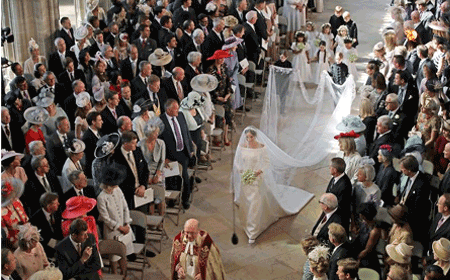Ten years ago, British “royalty”, Prince Charles and his wife Camilla visited the Caribbean and locals prostrated before them. Local leaders made arrangements for them to play the Steelpan and the sacred Rastafarian Nyabinghi drums.
Leslie from Africaspeaks.com wrote an insightful article titled Royal Visit Highlights Lingering Colonialism that brought attention to the dynamics of colonialism in this visit. This article is as relevant today as it was ten years ago when it was written, given the celebratory eruptions at the wedding of British monarch Prince Harry and his bride Meghan Markle. Yet the region is poorer today for elevating fake royalty to dizzying heights of reverence while neglecting the royalty inherent in resistant Caribbean voices who have worked hard at improving Caribbean societies. While many people gush at royalty and the “power of love”, for people of the Caribbean and wider global south, who are still faced with the structures of British colonialism imbedded deeply in our society and the world we live in, it is an opportunity to reflect on these issues.
The British Monarchy and the Empire of Violence
The British Empire was held together by violence in two forms. The first one was the military violence that invaded and conquered territories, set up slave plantations and brutally suppressed dissent and revolts. The second, and perhaps more dangerous form of violence, was the violence of “knowledge” which involved spreading a narrow and ideological system of values, culture and information as if it was the best and only one. Non-European and non-Christian ways of seeing and being were bastardized and destroyed. It is through this violence that Anglo-Saxonism firstly became the dominant European model of civilization and progress, and later the global model of civilization and progress.
It also explains how after more than 50 years of independence from Britain, the social, mental and global structures erected across the global south as part of colonial domination are still influential.
Generations of children had to sing “God Save the Queen” in local schools that instilled British and Christian values on young impressionable minds. Within this British educational system, ideas of white superiority and black inferiority, subservience to colonial authority and demonization of non-European cultures formed part of the structures that upheld the British colonial empire. This feeds into the global reverence for Britain and her monarchy.
While many people have very romantic images of the British monarchy, it presided over a reign of brutal violence that far exceeded that of Adolf Hitler, Joseph Stalin or the Butcher of Congo: King Leopold II of Belgium. Britain dominated the trade and enslavement of Africans, and at the height of its empire had colonies across the global, while boasting that the sun will never set on the British Empire. They also participated in the genocide of indigenous people in the Americas, Africa and Australia.
While in charge of India, British actions of increasing taxes and exporting crops grown by farmers caused a series of famines that resulted in the death of millions of Indians. In one of these famines, known as the Bengal Famine, Britain diverted food to its soldiers, and caused the death of between three and ten million people.
During the Mau Mau uprising against British rule in Kenya, the Kikuyu people were imprisoned in concentration camps and subjected to torture, executions and sexual abuse. Yet, despite being the most dominant colonial power, and with perhaps the most colonial crimes against humanity under its belt, Britain is still able to project an aura of respectability, honour and nobility. This allows them to avoid responsibility for their many atrocities.
Stolen Wealth of Nations
Across the global south, most countries that were colonized by Britain still maintain membership in the Commonwealth of Nations. Also called the Stolenwealth of Nations, this organisation is headed symbolically by the British queen. Once every four years, athletes from all of these countries participate in the Commonwealth Games, established by the Commonwealth of Nations, and again presided over by the British queen. It is a travesty that most global south leaders see it fit to maintain membership in this colonial organisation, rather than creating an independent global organisation to serve the interests of global south countries and to further decolonialism. It also reminds us that the structures of domination have survived long past the point of political independence more than 50 years ago.
Let us not forget that in the Caribbean, the countries of Jamaica, St Lucia, Barbados, St Vincent and the Grenadines, Antigua, Grenada and St Kitts and Nevis still maintain the Queen of England as their symbolic head. Guadeloupe and Martinique are still colonized by France. In addition, there have been concerns that there are moves to re-colonize the Caribbean given the situation in the former Netherlands Antilles (Bonaire, St. Eustatius and Saba) where in 2010 the Netherlands took control of these areas and declared them as municipalities of the “mother country”. This is a reminder that mental and political decolonization is an ongoing process across the global south.
How can global south people celebrate the romantic activities of the monarchy when the structures of colonialism are still so much a present part of day to day realities? Caribbean thinkers have long pointed out the damaging presence of the colonial jumbie or duppy. Celebrating without considering all of this is tantamount to celebrating colonialism. Consider this analogy. You are at home one evening, and intruders break into your house, kill some members of the family, rape some, and torture some. They steal the valuables in the home, and hold some members hostage.
What degree of psychological pressure would it take for those members of your house to accept guidance from the intruders on how to be a good person, how to educate your children, and how and who to worship? More so, to feel excited about one of the intruders’ impending marriage? These are the circumstances in which we find ourselves today.
To be continued in next week Tuesday issue of the Amandala

